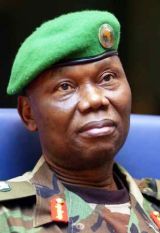Sudan’s Darfur a ‘timed bomb’ Waiting to Explode – AU
By Camillus Eboh
ABUJA, Dec 17 (Reuters) – Astronomical quantities of arms and ammunition have poured into Sudan’s Darfur region in the last two weeks and the government is poised for a major military offensive, the African Union said on Friday.

|
|
General Festus Okonkwo, the commander of the African Union observer force in Darfur. (Reuters). |
The AU commander in Darfur, Festus Okonkwo, said his efforts to mediate between government troops and rebels had yielded minimal results and the region was now a “timed bomb that could explode at any moment.”
“The quantity of arms and ammunition brought into Darfur to meet (the needs of) the present build-up of troops in the region is (so) astronomical that the issue is no longer whether there will be fighting or not, but when fighting will start,” said Okonkwo, who heads an AU mission of 834 cease-fire monitors in Darfur.
A Sudanese brigade, which normally numbers 600-700 troops, advanced toward Labado in south Darfur on Thursday, backed up by about 200 militia deployed alongside them, Okonkwo said.
“From a military point of view, this indicates an offensive, which if launched would be prejudicial to the peace process.”
The Nigerian commander was delivering a situation report to AU-sponsored peace talks in the Nigerian capital, which were suspended on Monday by the rebels who accused the government of launching an offensive.
Sudanese Agriculture Minister Majzoub al-Khalifa, representing his government at the talks, said after the AU report that it had called off the offensive. “We have instructed our troops to stop the operation and they did,” he said.
A rebel spokesman said talks would resume only when the troops withdrew to positions they occupied when a cease-fire was signed in April.
U.N. Secretary General Kofi Annan, speaking at a news conference in Brussels, said “I didn’t see that report, but if indeed (it is true), it is a major violation of the cease-fire … any such action will only create more difficulties for the internally displaced… I hope the government will refrain from any action of that kind.”
In London, a Foreign Office spokeswoman said “We’re gravely concerned about the ongoing cease-fire violations and the recent violence.”
British officials told the Sudanese foreign ministry on Thursday “…that Sudan is in breach of three U.N. Security Council resolutions and that the fighting must stop,” she said.
BOTH SIDES BREAK CEASE-FIRE
Okonkwo said both sides of the conflict, which has already displaced 1.6 million people and killed tens of thousands, were guilty of breaking the cease-fire.
He detailed one coordinated attack on the village of Ishma on Dec. 11 by government forces working in concert with Janjaweed militia, who burned and looted eight villages in advance of government troops.
“Some members of the international community have started to leave the region because of the speed and intensity of build-up of forces by the government and the reciprocal build-up by (rebel groups) SLA and JEM in Labado and Mahajiriya, which are seen by many as the main battleground,” Okonkwo said.
The commander of the African Union force also logged several recent attacks by rebels, including an ambush by the Sudan Liberation Army (SLA) on the British charity Save the Children on Dec. 12. Save the Children said two people were killed and one injured in the attack.
“The SLA was involved in the attack as two Land Rovers belonging to Save the Children (UK) were recovered from an SLA camp in Jurof,” Okonkwo said.
The African Union called on the government to withdraw its newly deployed troops to reduce tension, and asked the SLA to stop seizing vehicles, stealing livestock and attacking government outposts.
After years of tribal skirmishes over scarce resources, rebels took up arms last year accusing Khartoum of neglect and of using the Janjaweed to loot and burn non-Arab villages. Khartoum denies arming the Janjaweed and calls them outlaws.
The United Nations has said Darfur, an arid area the size of France, is suffering from one of the world’s worst humanitarian crises with 2.3 million people in need of aid.
